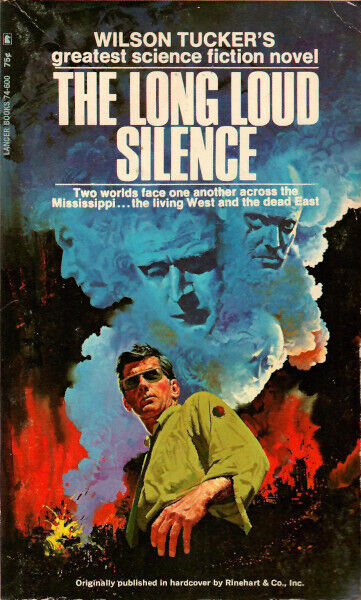While I Was Sleeping
The Long Loud Silence
By Wilson Tucker

1 Jun, 2025
Wilson Tucker’s The Long Loud Silence (1952, 1954) is a stand-alone post-apocalyptic novel.
The enemy struck without warning. Major cities like Chicago were incinerated with atomic bombs. Lesser cities and towns did not rate atomic weapons. Instead, bombs delivered weaponized diseases.
Millions died… east of the Mississippi. The enemy’s weapons could not reach the west. Therefore, those twenty-two states were spared.
Good news for Corporal Russell Gary, who wakes from a bender to discover that he is one of the survivors. Bad news for Gary, who wakes from a bender to discover that he is one of the survivors… on the wrong side of the Mississippi.
A veteran of WWII, Gary has a knack for not dying. This serves him well as he finds his way in the suddenly depopulated Illinois. The issue isn’t food — in these early days, store shelves still have edible food — so much as it is the other survivors. Among Gary’s first discoveries, the corpse of a murdered woman.
Only a fool or a person without a choice would stay in the eastern half of the nation. Gary soon discovers that he and every other survivor has no choice. Almost every bridge across the Mississippi was swiftly demolished on the orders of a government determined to quarantine the east. The few remaining bridges are heavily patrolled, as are long stretches of the western bank. Those who try to cross from east to west are killed.
When Gary happens across a still-functioning radio, he discovers the survivors’ situation is even worse than he thought. Officially, every American east of the Mississippi died on or soon after June 20th. The only people remaining in the east are the very lucky few who were in sealed bunkers like the ones under the Pentagon, and a small army of enemy agents.
Why is the western government lying? Because the remnant US suspects that anyone surviving in the east is an asymptomatic carrier, capable of infecting the west. Carriers must be killed. One day, the west will reoccupy the east. When that day comes, the survivors will greet their liberators, only to be shot out of hand by patriotic American soldiers certain they are ridding their land of enemy occupiers.
Gary’s best option is to survive as long as he can. Gary will focus on the bandits and cannibals preying on the other survivors now. Gary can worry about inevitable reclamation by the east when it becomes relevant. Maybe Gary will die before the west invades. Maybe he will get lucky.
Gary gets lucky. A convoy loaded with gold and gullible soldiers wending its way west provides Gary with a chance to escape. Or so it seems.
~oOo~
There are at least two editions of this novel. I read the one that does not invite comparisons with A Boy and His Dog. On that note, I am not sure which edition of this I read back when. The plot was familiar but none of the covers were.
Tucker does not name the enemy, nor does he specify the date beyond on or soon after Wednesday, June 20th. The textual evidence suggests the 1950s. June 20 was a Wednesday in 1951 and in 1956. The lack of H‑bombs points to 1951, which predates the first publication of this book.
I don’t know how long the quarantine can hold. The Mississippi river system provides a natural border up to Minnesota. North of that, a person on foot might be able to elude mounted patrols2. Still, the survivors have to try, I suppose.
A detail shared with a tremendous number of post-apocalyptic novels: life in the east descends into a Hobbesian war of all against all. Alliances not based in kinship are temporary, pragmatic, and in many cases ruses to get the upper hand on gullible dupes. This expectation is rather bizarre, as humans are social beings, empirically shown to help each other after disasters3. This makes sense as there are many survival strategies open to communities that lone wolves are denied4.
Loud is a short novel. Tucker doesn’t have any pages to waste, despite which Gary manages a surprising amount of gloomy, pessimistic introspection. Other characters are sketches, sufficient to their roles. The eventual resolution isn’t surprising… except for Tucker’s relentless dedication to his grim logic. Even adorable children do not get plot armor.
The Long Loud Silence is out of print. As far as I can tell, the most recent English language edition was 1993. That surprises me.
1: Readers will be consumed with worry over the fate of Canada. All signs point to Ontario, Quebec, and the Atlantic Provinces having been destroyed along with the eastern US. At least, there’s no reason to think the enemy spared them. I cannot imagine Alberta and BC and the other provinces and territories could bear the thought of living without Toronto, so presumably they died of grief.
2: USA delenda est.
3: Obligatory citation of Rebecca Solnit’s A Paradise Built in Hell.
